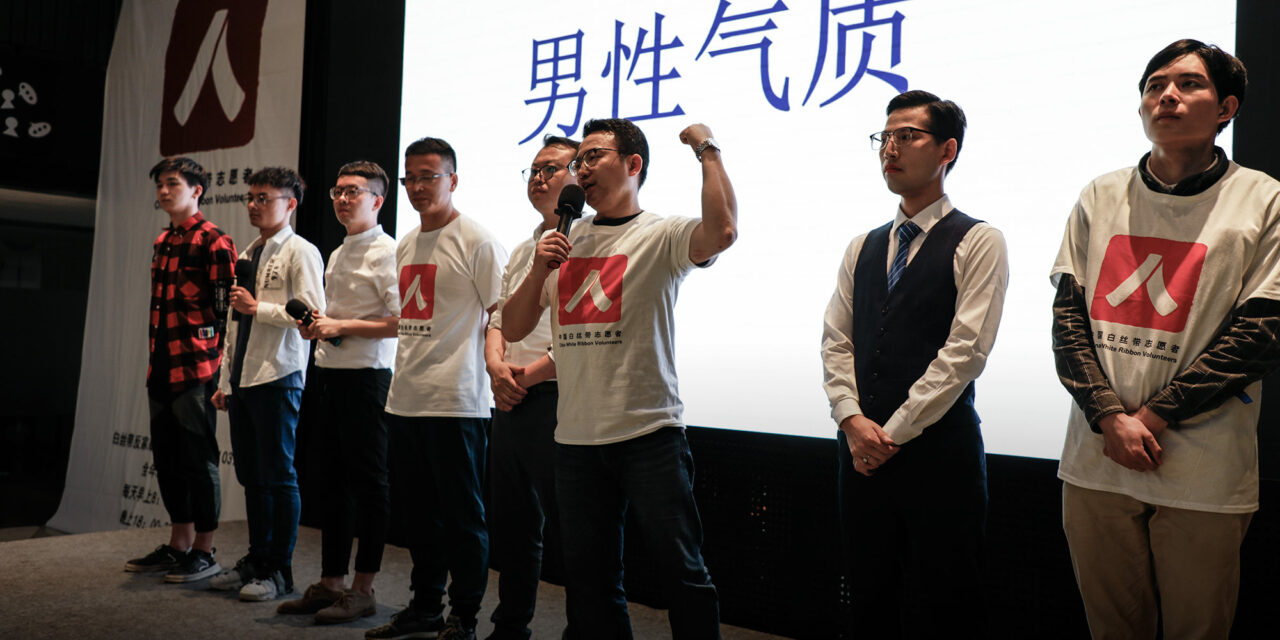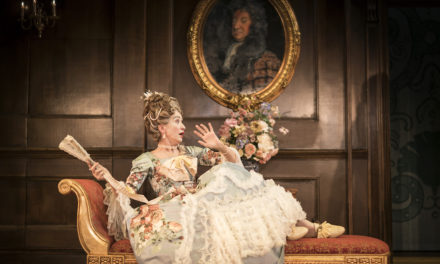ZHEJIANG, East China — On a theater stage in the city of Hangzhou, a male character reflects on the time he date-raped a woman. “I finally broke through her defense and forcefully penetrated her. Controlling her, I felt the happiness of a conqueror. The insertion of my penis seems to have stamped a seal on her body, a label marking my sovereignty.”
The unflinching scene is part of a monologue in The Penis Monologues, a play that pitches itself as a counterpart to the well-known feminist play “The Vagina Monologues.” Written by Fang Gang, a renowned Chinese sexologist, The Penis Monologues examines aspects of what Fang calls “dominant male temperament” — a phrase that shares certain similarities with the English phrase “toxic masculinity.”
Based on real case studies collected during Fang’s research on gender while at Beijing Forestry University, the play’s 12 episodes are all performed by 10 amateur male actors. Before coming to Hangzhou in May, performances took place in Beijing and Shenzhen. However, Fang’s also had to overcome his fair share of obstacles in China, where frank conversations about sex and gender are still taboo. Performance in the southern city of Guangzhou was abruptly canceled for unknown reasons, while the show’s Chinese name deliberately avoids using the word “penis.”
Despite its limited run, The Penis Monologues is a remarkably candid examination of sex and relationships in a deeply patriarchal country. In 2017, a wide-ranging online survey of college students found that it was not uncommon for respondents aged between 18 and 22 — most of whom were female — to experience sexual harassment on campus, but that less than 4% would report it to the school authorities or police. And although dozens of women spoke upabout sexual harassment issues in the country last year, the impact has not been as strong as in Western societies, where soul-searching is taking place among certain groups of men.
Fang hopes The Penis Monologues will prompt more heterosexual Chinese men to reexamine the ways they approach and treat women. “I want to reflect on and criticize the violence of men against women, and promote gender equality from a male perspective,” Fang tells Sixth Tone. “Unilateral efforts from women are far from enough; men must act, too.”
That raison d’être resonates with Tao Xiaotao, a social worker specializing in sex education who is also the play’s Hangzhou producer. The mother of two young boys hopes that news of the performances will spread on social media and get more straight men thinking about their interactions with women. “Drama is a more acceptable form of expression (than directly calling for a change), as it’s easier for people to relate to characters in a play, which then prompts them to reflect,” she says.
But the play’s subject matter hasn’t made it easy for Tao to find willing actors. Most men she approached declined after reading monologue titles like “Penis Size,” “Domestic Abuser,” and “Erectile Dysfunction.” “They are afraid of being mocked or judged by the public,” she tells Sixth Tone.

A volunteer applies makeup on one of the actors before the play The Penis Monologues in Hangzhou, Zhejiang province, May 18, 2019. Courtesy of White Ribbon’s Hangzhou branch
When 42-year-old business owner Yu Lei read the play for the first time, he was shocked that it so boldly addressed taboo subjects. But after attending one of Fang’s sex-ed public lectures and seeing members of the audience calmly taking notes, he decided to join the troupe, despite never having acted before.
Tao assigned Yu to the play’s first monologue, “Date Rape,” which tells the story of a male college student forcing his girlfriend to have sex with him in a hotel room. Yu was so nervous about performing that he told his wife he was taking part in a charity event organized by White Ribbon, the advocacy organization launched by Fang in 2013 to end the violence perpetrated by men against women. But he needn’t have worried: His performance wins thunderous applause from the 90 or so people in the audience, though Yu later confesses to Sixth Tone that he slightly regrets doing it. “I’m afraid people might think it was my own story,” he says.
Wang, who used to work for a company that builds subway systems, once accepted the combination of extreme work hours and after-work social gatherings organized by his male bosses. But that culture kept him from spending time with his family, causing his wife to claim she was trapped in a “widow marriage.” So, Wang decided to make a change: In 2015, he quit his job and opened one of only a handful of sex shops in Hangzhou.
But as Wang’s new business flourished, he became more and more concerned about male chauvinism found in sex culture. “Most of my male customers want to buy something that can make them bigger downstairs or last longer in bed, but few of them care about what their female partner wants to experience in her sex life,” says the 41-year-old. “Sexual violence can be more subtle than physical violence, but it’s still something we should discuss and pay attention to.”
Assertions of masculinity come up often in Fang’s play. Several monologues dwell on the so-called masculine temperament, which “requires men to succeed in their careers and be in a dominant position in their relationships with women,” Fang says. The anxiety to assert their manliness brings men not only “welfare and power,” but also stress and pain, he explains.

Two actors portray the story “Gender Queer” during the play The Penis Monologues in Hangzhou, Zhejiang province, May 18, 2019. Fan Yiying/Sixth Tone
That pain is familiar to Ye Chuyang, a queer actor portraying their own experiences in the monologue “Gender Queer.” “I don’t agree with binary gender divisions, because it limits people’s possibilities,” Ye tells Sixth Tone. “Most people think men are supposed to be macho, decisive, and strong. They don’t appreciate feminine or delicate men. Though my parents appreciate the sensitive and gentle side of me, they prefer me to be strong and tough just like other boys.”
Ye thinks the play is a chance to both educate people about sexual diversity and help more men understand the experiences of women. “If men could break the rules and speak out, women would feel encouraged and less lonely in this battle,” he says.
Gu Wei’s story, meanwhile, is probably the most personal. A former domestic abuser, his monologue reflects on how, in the past, he treated his now ex-wife as a possession and didn’t tolerate any challenges to his authority in their marriage. “It’s typical dominant masculinity,” he says.
Gu, who has since reformed his behavior and become an activist and volunteer at White Ribbon, hopes to raise awareness of an issue that many Chinese women suffer in silence. Though a national law to protect victims of domestic violence came into effect in 2016, in reality, women who report abuse seldom receive adequate help from the authorities, which sometimes list domestic violence cases as “family conflicts.”
Born in 1999, Luo Bin is the youngest in the crew. Growing up, Luo witnessed how his grandfathers dominated the family and how they snapped at his submissive grandmothers. The young Luo concluded that such behavior was normal. After he got to college, he sided with his male friends when they complained that their girlfriends wouldn’t have sex with them.
Working on the play has convinced Luo that his long-held attitudes toward gender roles are misguided. “It didn’t occur to me that when your girlfriend says no, it means no,” he says. “We hurt girls before we know it. I hope the play can make the public aware of date rape and prevent it from happening.”
The sophomore college student acts as the play’s host, going up to other actors and asking questions like “What’s a real man?” and “What’s your favorite sex position?” The questions sometimes make the spectators visibly uncomfortable, but Luo thinks they’re necessary to foster open conversations about gender equality. “Now I know if we don’t give people the right to choose what they really want, then it’s not equal at all,” he says.
Editor: Matthew Walsh.
This article was originally posted on Sixth Tone and reposted with permission.
This post was written by the author in their personal capacity.The opinions expressed in this article are the author’s own and do not reflect the view of The Theatre Times, their staff or collaborators.
This post was written by Fan Yiying .
The views expressed here belong to the author and do not necessarily reflect our views and opinions.


















